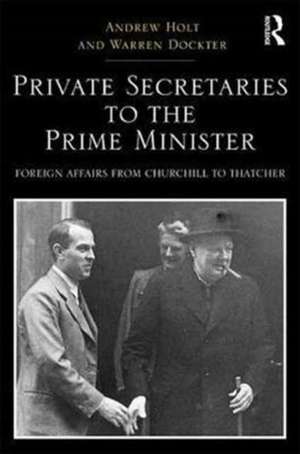Private Secretaries to the Prime Minister: Foreign Affairs from Churchill to Thatcher: Routledge Studies in Modern British History
Editat de Andrew Holt, Warren Dockteren Limba Engleză Hardback – 27 iul 2017
Din seria Routledge Studies in Modern British History
-
 Preț: 311.91 lei
Preț: 311.91 lei -
 Preț: 325.49 lei
Preț: 325.49 lei - 9%
 Preț: 934.91 lei
Preț: 934.91 lei -
 Preț: 311.41 lei
Preț: 311.41 lei - 9%
 Preț: 1490.11 lei
Preț: 1490.11 lei -
 Preț: 311.18 lei
Preț: 311.18 lei -
 Preț: 327.47 lei
Preț: 327.47 lei -
 Preț: 334.03 lei
Preț: 334.03 lei -
 Preț: 310.88 lei
Preț: 310.88 lei -
 Preț: 311.41 lei
Preț: 311.41 lei -
 Preț: 311.41 lei
Preț: 311.41 lei -
 Preț: 311.41 lei
Preț: 311.41 lei -
 Preț: 290.17 lei
Preț: 290.17 lei -
 Preț: 286.76 lei
Preț: 286.76 lei - 18%
 Preț: 1000.27 lei
Preț: 1000.27 lei - 18%
 Preț: 999.02 lei
Preț: 999.02 lei -
 Preț: 417.60 lei
Preț: 417.60 lei - 31%
 Preț: 762.50 lei
Preț: 762.50 lei -
 Preț: 484.85 lei
Preț: 484.85 lei -
 Preț: 436.14 lei
Preț: 436.14 lei -
 Preț: 371.30 lei
Preț: 371.30 lei - 18%
 Preț: 1000.27 lei
Preț: 1000.27 lei -
 Preț: 369.73 lei
Preț: 369.73 lei - 18%
 Preț: 1003.30 lei
Preț: 1003.30 lei -
 Preț: 383.93 lei
Preț: 383.93 lei - 12%
 Preț: 299.52 lei
Preț: 299.52 lei - 18%
 Preț: 1002.32 lei
Preț: 1002.32 lei -
 Preț: 410.07 lei
Preț: 410.07 lei - 30%
 Preț: 875.55 lei
Preț: 875.55 lei - 18%
 Preț: 1008.65 lei
Preț: 1008.65 lei - 25%
 Preț: 823.63 lei
Preț: 823.63 lei -
 Preț: 384.48 lei
Preț: 384.48 lei - 26%
 Preț: 846.78 lei
Preț: 846.78 lei - 18%
 Preț: 1005.04 lei
Preț: 1005.04 lei - 25%
 Preț: 851.40 lei
Preț: 851.40 lei - 30%
 Preț: 771.17 lei
Preț: 771.17 lei - 25%
 Preț: 658.36 lei
Preț: 658.36 lei - 29%
 Preț: 653.49 lei
Preț: 653.49 lei - 18%
 Preț: 891.36 lei
Preț: 891.36 lei
Preț: 1000.27 lei
Preț vechi: 1219.84 lei
-18% Nou
Puncte Express: 1500
Preț estimativ în valută:
191.42€ • 207.86$ • 160.80£
191.42€ • 207.86$ • 160.80£
Carte tipărită la comandă
Livrare economică 22 aprilie-06 mai
Preluare comenzi: 021 569.72.76
Specificații
ISBN-13: 9781409441809
ISBN-10: 1409441806
Pagini: 228
Dimensiuni: 156 x 234 x 19 mm
Greutate: 0.45 kg
Ediția:1
Editura: Taylor & Francis
Colecția Routledge
Seria Routledge Studies in Modern British History
Locul publicării:Oxford, United Kingdom
ISBN-10: 1409441806
Pagini: 228
Dimensiuni: 156 x 234 x 19 mm
Greutate: 0.45 kg
Ediția:1
Editura: Taylor & Francis
Colecția Routledge
Seria Routledge Studies in Modern British History
Locul publicării:Oxford, United Kingdom
Public țintă
PostgraduateCuprins
Introduction
Charles Powell
1. Managing a Giant: Jock Colville and Winston Churchill
Warren Dockter
2. Advising the Un-advisable: The Number 10 Private Office and the Suez Crisis
Kevin Ruane
3. Philip de Zulueta
Peter Catterall
4. Oliver Wright
Andrew Holt
5. Michael Palliser
John W. Young
6. ‘Sound and Comfortable Men’: Peter Moon, Lord Bridges and Britain’s Entry into the EEC
Nick Thomas
7. Patrick Wright and Bryan Cartledge
John Shepherd
8. Margaret Thatcher’s Private Secretaries for Foreign Affairs, 1979–1984
Aaron Donaghy
Conclusion: The Prime Minister’s Private Office from John Martin to Chris Martin
Anthony Sheldon
Appendices
Appendix I: Private Secretaries to the Prime Minister with responsibility for foreign affairs, 1945–2015
Appendix II: Principal Private Secretaries to the Prime Minister, 1945–2015
Charles Powell
1. Managing a Giant: Jock Colville and Winston Churchill
Warren Dockter
2. Advising the Un-advisable: The Number 10 Private Office and the Suez Crisis
Kevin Ruane
3. Philip de Zulueta
Peter Catterall
4. Oliver Wright
Andrew Holt
5. Michael Palliser
John W. Young
6. ‘Sound and Comfortable Men’: Peter Moon, Lord Bridges and Britain’s Entry into the EEC
Nick Thomas
7. Patrick Wright and Bryan Cartledge
John Shepherd
8. Margaret Thatcher’s Private Secretaries for Foreign Affairs, 1979–1984
Aaron Donaghy
Conclusion: The Prime Minister’s Private Office from John Martin to Chris Martin
Anthony Sheldon
Appendices
Appendix I: Private Secretaries to the Prime Minister with responsibility for foreign affairs, 1945–2015
Appendix II: Principal Private Secretaries to the Prime Minister, 1945–2015
Notă biografică
Andrew Holt taught at the University of Nottingham, King’s College London and the University of Exeter, and held a visiting fellowship at Churchill College, Cambridge, before joining the Civil Service. He is the author of The Foreign Policy of the Douglas-Home Government: Britain, the United States and the End of Empire (2014).
Warren Dockter is a Lecturer in International Politics at Aberystwyth University, having previously been a Junior Research Fellow at Clare Hall, Cambridge. He is the author of Winston Churchill and the Islamic World: Orientalism, Empire and Diplomacy in the Middle East (2015) and edited Churchill at the Telegraph (2015).
Warren Dockter is a Lecturer in International Politics at Aberystwyth University, having previously been a Junior Research Fellow at Clare Hall, Cambridge. He is the author of Winston Churchill and the Islamic World: Orientalism, Empire and Diplomacy in the Middle East (2015) and edited Churchill at the Telegraph (2015).
Descriere
The importance of the Prime Minister in British foreign policy decision-making has long been accepted by historians. However, whilst much attention has been given to high level contacts between leaders and to the roles played by the Premiers themselves, much less is known about the people advising and influencing them. In providing day-to-day assistance to the Prime Minister, the Private Secretary could wield significant influence on policy outcomes. This book examines the activities of those who advised Prime Ministers from Winston Churchill (1951-55) to Margaret Thatcher during her first administration (1979-83).
